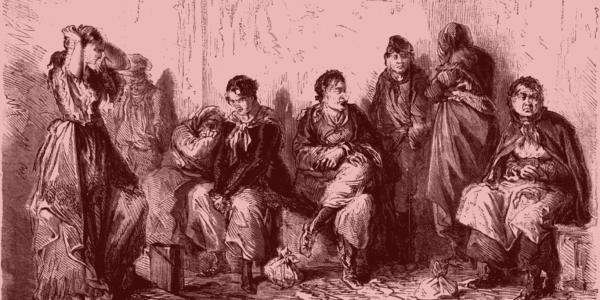Interview with Faculty Fellow Heather Berg
While interviewing subjects for her first book, Porn Work: Sex, Labor, and Late Capitalism (2021), Heather Berg, assistant professor in the Department of Women, Gender & Sexuality Studies, says the porn workers taught her a lot about how to think about her own job. “One performer joked that she would write an ethnographic exposé about graduate student exploitation when I told her how much I got paid as a lecturer — as much per month as she made in two five-hour scenes,” Berg says. That exchange illustrates the nature of Berg’s next book project, “An Intellectual History of the Sex Worker Left,” in which she analyzes two centuries of criticism by sex workers of non-sex work, unpaid sex, citizenship and bourgeois morality. Here, she offers an early look at the project, the focus of her spring 2023 Faculty Fellowship in the Center for the Humanities.
What is your book about?
The book is a study of sex worker radicals’ political thought. It turns a sex worker lens outward to explore how sex workers on the left theorize unpaid sex, straight (non-sex) work and how to engage the state.
How does your study differ from other investigations of sex workers? Is this a U.S. or global inquiry?
Most sex work research is about the work itself, or, less often, sex workers’ social movements. I wanted to explore sex worker theorizing instead. In short, this is a story about what sex workers think rather than about what they do.
I put out a wide call for interviewees who identified as sex workers on the left. Most people who responded, but not all, are from the U.S.
The sex workers who animate the book say that outsiders’ fascination with sex work as a uniquely exploitative form of work and sex got them asking questions about what makes work or sex “good.”
What sets sex workers apart in their critique of culture/politics/economy?
Sex workers’ marginalization in relationship to normative ideas of good work, sex, and citizenship equips them to theorize those norms. The sex workers who animate the book say that outsiders’ fascination with sex work as a uniquely exploitative form of work and sex got them asking questions about what makes work or sex “good.” The sense that being outside of a norm makes you better able to critique it is something that feminists, queer theorists and scholars of Black radical thought have argued for a long time.
Beyond this, one thing that makes sex worker theory distinct is that working-class and “lumpen” (informal and criminalized workers, the unemployed and so on) people have often found time a barrier to study and written knowledge production — it’s hard to read when you’re working all the time! But people often do sex work because, paying more in a shorter time than most working-class jobs, it leaves them time for other things. The thinkers in this archive fill that time at least in part with theorizing.
Tell us about your sources — what are you drawing from?
The project is grounded in interviews with anti-capitalist sex workers and in sex worker cultural production (e.g., essay, memoir, poetry, digital art and agitprop) dating from the 19th century to today. There’s a real wealth of sex worker writing that the usual citation practices of the academy miss.

Have you had any moments of surprise in your research so far?
Absolutely. I wasn’t surprised, exactly, but very much moved to hear from interviewees about the connections with communities of mutual aid, chosen family, and even lovers that shaped their politics. One person talked about a fellow street kid who gave them a torn-up copy of Emma Goldman’s Anarchy and the Sex Question.
Another thing that’s been amazing to see is how the workers I spoke to use sex work dollars to do transformative things out in the world. One stripper in Texas works an extra shift to cover the costs any time the abortion fund she helped to start needs cash. She thought it was hilarious that customers had no clue where their money was going.
Can you tell us about a figure from this movement you think should be more widely known?
This project is focused less on a cohesive movement (though I think that’s crucial!) than on the dispersed individuals and communities who are working through ideas. That said, there are a number of people doing both movement work and this kind of intellectual production. Tamika Spellman and Lorelei Lee, both brilliant thinkers and activists, animate a lot of the thinking in the book.
Headline image: During an 1871 working-class uprising in Paris, the so-called pétroleuses, prostitutes among them, were charged with enacting violence against the state by burning government buildings. The ruling class believed that sex workers were more likely to be communards because they had already abandoned the respectability of marriage and waged work. Pétroleuses arrested in Versailles. Image by Robertson, A. Daryez - Vicomte de La Vausserie, Histoire anecdotique et illustrée de la guerre de 1870-71 et du siège de Paris, Paris, Josse, 1873, 2 t. en 1 vol., in-4, p. 193. Public Domain via Wikipedia Commons.





